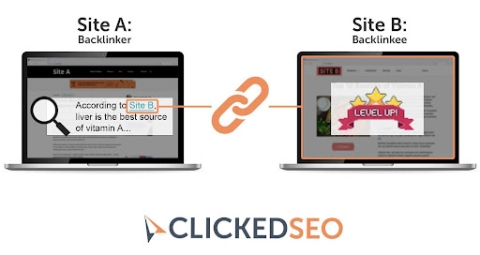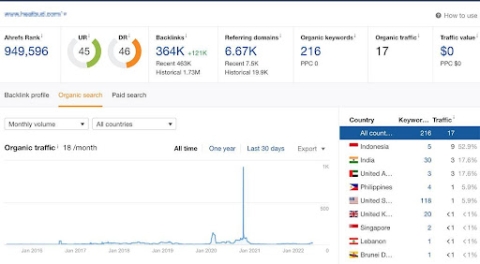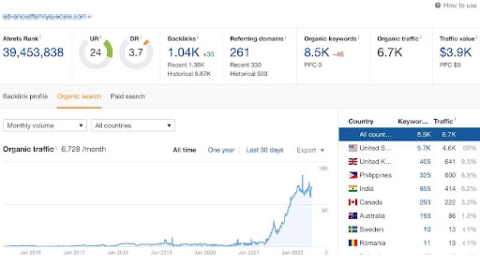Backlinks and SEO: A Complete Guide

Backlinks and SEO: A Complete Guide
High-quality backlinks are paramount for SEO. Here’s why, and what to do about it.
Updated 11/10/2023
If you’re familiar with the term “SEO”, then odds are you’ve also seen the word “backlink”. There’s a reason the 2 terms are often paired with each other – backlinks are a huge part of SEO.
But what exactly is a backlink and what’s all the buzz about?
Here is everything you need to know about how SEO backlinks work, why they work, and the best ways to leverage them for search engine success.
Jump to:
- What is a backlink?
- How are backlinks important for SEO?
- Why are backlinks important for SEO?
- What makes a good backlink?
- How to build backlinks
- Backlinking strategies to avoid
- How to hire a strong backlink strategy agency
Looking to partner with an SEO agency for backlinking? Connect with top-rated companies on The Manifest.
What is a Backlink?
A backlink (also referred to as just a “link”) is when one website places a link from their website to your website.
A website’s volume of inbound links from influential & relevant websites will play a big role in its performance in search engines.

Source: Clicked SEO
In the above example, site A is linking to Site B, giving Site B a backlink & SEO benefit.
Since obtaining these links will help enhance a website’s position within search engines, it is a major focus of SEO. Working to earn and increase the volume of inbound backlinks is referred to as “link building” or “backlink building”.
How Important are Backlinks for SEO?
Since search engine algorithms are secret and proprietary, we will never know exactly what all the SEO ranking factors are or how important each one is.
What we do know is that of the 100s of ranking factors, backlinks are a huge one, arguably even the biggest one.
Google itself has acknowledged the heavy use of backlinks in their ranking algorithm, and countless 3rd party studies such as this one have confirmed the same.
Backlinks are, have been, and always will be extremely important for SEO.
Why are Backlinks Important for SEO?
Now for why backlinks are used as a ranking factor.
Search engines like Google have established that one of the best automated ways to determine the quality & trustworthiness of a website is the volume of quality inbound backlinks.
Backlinks are “votes of trust”. If a large & respected website trusts a website enough to link out to it as a source, then Google’s crawlers will trust that website as well (and rank it).
Here’s an example. Let’s say I run a website in the eye care niche and write a blog article about risk factors for cataracts (a common eye disease). WebMD is writing their own article about cataracts.
In WebMD’s article, they trust my website enough to link out to it as a source. Since WebMD is a well-respected website with very strict editorial standards, that backlink gives me huge brownie points with search engines.

Source: Cue Math
Think back to grade school when you learned about the transitive property, which states if a = b and b = c then a = c.
While not exactly the same, links pass value in a very similar way. Since WebMD (“b” in the above example) trusts me, and search engines (“a” in the above example) trust WebMD, then search engines will trust me (“c” in the above example).
Also read, 'How to Preserve SEO Rankings During a Website Redesign'.
What Makes a Good Backlink?
Remember:
“The higher the volume of inbound links from influential & relevant sites, the better your website will perform in search engines.”
Just as important as the quantity of links is the quality of links. 1 link from a relevant & well-respected website will yield more SEO benefit than 1,000 spammy black hat SEO links.
There are 2 primary factors that make a good link: the “Domain Authority” and level of prestige of the linking website.
Domain Authority (used interchangeably with DA, Domain Rating, DR, or just “authority”) are 3rd party SEO metrics between 1 and 100 that measure the backlink profile or “rankability” of a website. The better the backlink profile of a website, the higher its Domain Authority. The higher the authority of the linking website, the more valuable that link is to the linkee. In other words, the more high-quality links that point to the website that links to your website, the more valuable that link is to you.
I put quotations around “Domain Authority” because it is not the end-all, be-all metric for gauging the influence and relevance of a website. The metric can be manipulated. Websites that sell backlinks (a black hat SEO tactic) have come to manipulate these numbers by building spammy black hat links. A website can sometimes have a very high authority score, but still have very low value to search engines.
Here's an example of one of those websites:

This graphic, from SEO tool Ahrefs shows the SEO stats of a website with artificially inflated authority. Its DR, or Domain Rating (the Ahref’s equivalent of Moz’s Domain Authority) is 46 which is relatively high.
It has 364,000 backlinks, but only 17 monthly users with a traffic value of $0. That means that this website boosted their 3rd party authority score with spammy links, but search engines didn’t fall for it. Even though they have high “authority” and lots of backlinks, they don’t have any rankings or traffic, so a link from them would not help your website.
On the flip side, here’s a website with low authority but great traffic & rankings:

This website’s DR is only 3.7, but it has high traffic and lots of high value ranking keywords. A backlink from this example website would mean a lot more than a backlink from the first example website.
To holistically look at the influence & “rankability” of a website, you should look at the website authority in conjunction with their organic traffic, rankings, and the value of that traffic & rankings.
Auditing the influence, authority & trustworthiness of a website will help you determine the value of an inbound backlink from them.
Backlinks Should be Relevant to Linking Content
Just as important as the authority of the linking site is the relevance and context of the link.
If your website is in the tech niche, then a backlink from TechCrunch will be much more valuable than a link from Healthline. The reason for this is simple – it makes more sense from a user standpoint and is less likely to be a financially incentivized link. If the link is bought, then it is not a “vote of trust”.
Search engines like real, relevant links. They hate paid links, and if they suspect it, they will either ignore it or penalize you.
*It is also important to note that for a backlink to carry any weight, the link must be dofollow.
How to Build High-Quality Backlinks
Since the number of high-quality dofollow inbound backlinks is so influential in a website’s search engine visibility, then building these links (link or backlink building) is a high priority for SEO’s.
To build high-quality links, do this:
Create phenomenal blog content with the user’s experience in mind, then send strategic, value-added outreach asking other websites to link from their website to that content.
Simply put, to get highly respected websites to link from their website to your website, your website needs to be awesome.
Once your website & content are in order, you need to do some prospecting on link additions from relevant websites, find the right person to contact, and think of a way that adding your link will benefit them. Then send your pitch.
How do you offer value to them (that isn’t money)? There are many specific & advanced methods of doing this, such as broken link building, listicle additions, linkable infographics, guest blogging, and unlinked mentions.
It's essential to be wary of low-quality links. Social media platforms serve as powerful tools for amplifying content and discovering new link opportunities. Nofollow links, although not contributing to Pagerank, can still drive valuable referral traffic. Understanding Google's algorithm, particularly the impact of Penguin updates, is crucial for avoiding penalties and maintaining a healthy link profile.
Leveraging tools like SEO tools enhances the efficiency of keyword research, aiding in the identification of valuable linkable assets. Google search remains a primary channel for discovering organic search opportunities and evaluating the effectiveness of a site's SEO strategies.
At the end of the day, it all comes down to writing amazing content and pitching that content to big publications in a highly targeted & appealing way.
Backlinking Strategies to Avoid
If you or the agency you hire tries to take black hat shortcuts by tricking search engines with fake links at scale, it won’t help you. In fact, those antics could end up getting you a Google penalty.
Here are the things to avoid when building links:
- Writing subpar content and expecting other websites to link to it
- Over-linking directly to your “money pages” instead of blog resources
- Buying links, especially bot-generated links at scale (PBN links)
- Over-optimizing the anchor text of your backlinks
- Hiring an agency that promises to “boost your Domain Authority” or build X number of links a month (usually for dirt cheap)
- Sending “spray and pray” untargeted link-building email blasts
How to Hire an Agency that Builds High-Quality Backlinks
As if it’s not hard enough hiring an effective SEO company already, finding one that builds real, high-quality links is even harder.
There is so much misunderstanding on how links work and link building. Many novices think “Domain Authority” is the end-all, be-all metric to the efficacy of a link-building campaign, so they will hire an agency strictly to boost this number… And what do those companies do? They artificially inflate it.
How do you make sure that the agency you hire is effective at building high-quality links?
- First, they need to actually build links. Some companies try to claim that you can simply write great content and the links will come naturally. Don’t get me wrong, great content is paramount to getting links, but it doesn’t stop there. To get natural links, you need to rank. And to rank, you need links.
- Second, their approach needs to focus on building stellar content, then sending targeted, value-added outreach to obtain links. To make sure that your prospective SEO company checks both boxes, simply ask them about their SEO strategy. They should talk about content marketing and link building through highly targeted, customized outreach.
- Next, ask them to share link-building statistics and case studies. Keep a look out for links from high-profile websites and the associated results that they delivered for their clients.
Make Backlinking Strategy a Core Part of Your SEO Approach
Understanding the dynamics of link building strategy is crucial. Web pages serve as the foundation for establishing a robust link profile. Pagerank, a key metric in Google's algorithm, emphasizes the importance of quality content.
By integrating relevant keywords and optimizing pieces of content, site owners can significantly impact their search engine rankings. Exploring various types of links, both internal and external, contributes to the overall link-building strategy, enhancing the visibility of a website in the SERPs.
To gain these links, you (or the agency that you hire) need to work hard on your website’s content and then send strategic, persuasive outreach to convince other websites to link from their site to yours.
You should not try to take shortcuts with spammy link-building tactics – it will do more harm than good.
Building real links is hard, tedious work – but that’s why links are so valuable. With time, search engines will pick up on your hard work and repay you with rankings.
Find the right SEO company for your needs on The Manifest.
Additional Reading:
